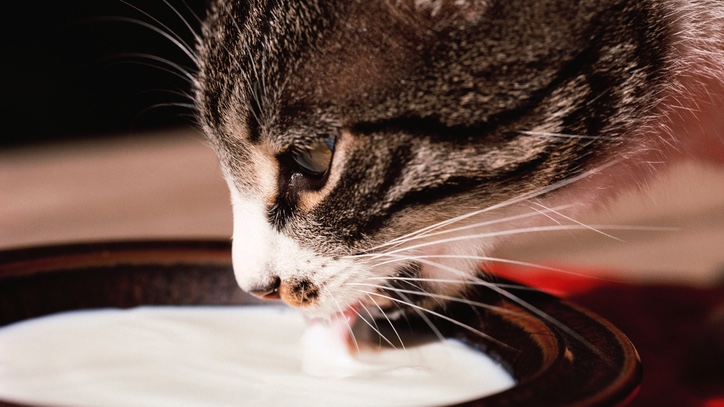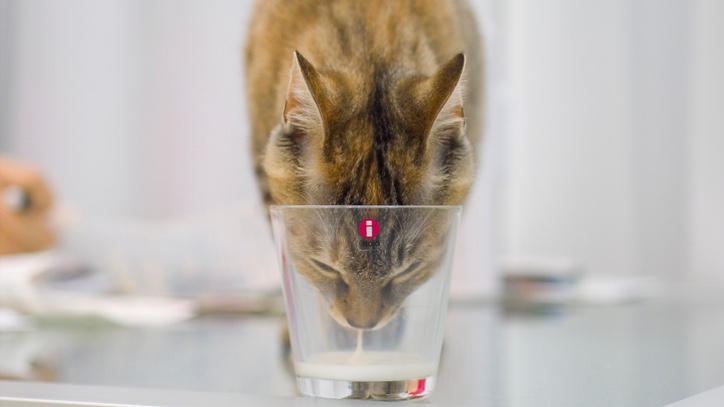Are cats lactose intolerant or can they drink milk or cream?
They certainly seem to adore milk but are cats lactose intolerant? Let's find out!

Get the best advice, tips and top tech for your beloved Pets
You are now subscribed
Your newsletter sign-up was successful
When you own a cat, it's tempting to grab some milk from the fridge and pour it into a bowl – but are cats lactose intolerant? If so, doesn't that mean you're potentially causing harm by giving them dairy products?
What about when they're young: can kittens drink milk? And if you can't give them the white stuff, why do we seem to strongly associate cats with it? Surely that's just plain irresponsible?
But those are the questions and we're really looking for answers. And the most important of them all is that, yes, in general, cats are lactose intolerant.
Sure, that may be something of a blow for kitty owners but there's no getting around the fact that you need to be wary of giving your cat milk, cream or a delicious yogurt. And there are also some very simple reasons, as we're about to find out.
Are all cats lactose intolerant?
First thing first, let's glean at least one positive out of this situation – not all cats are lactose intolerant.
It all comes down to their genetic makeup which means some of them can actually take lactose in their stride. Much also depends on age. Cats tend to lose the ability to produce the enzyme lactase between weaning from around the age of four weeks until roughly six months into their life. They're absolutely fine with lactose up until then.
There's a reason for this. Cats don't naturally need high levels of lactase in their body as they grow older. They only need it when they're seeking to break down the sugars that are found in their mother's milk.
Get the best advice, tips and top tech for your beloved Pets
Since, as adult cats, milk isn't a natural food, their bodies tend to dispense of the enzyme. Yet there are times when a cat is lucky enough to retain the ability to produce lactase. They're the exception rather than the rule, though.

How can I tell if my cat is lactose intolerant?
Working out if your cat is lactose intolerant can be relatively straightforward – drinking milk or consuming any dairy product can cause an upset stomach in cats and that's usually a good indication of a problem! But, as always, it's not always that simple.
Some studies have shown, for example, that adult cats can ingest six grams of lactose per day without showing signs of any problems. That equates to about 130ml of cow's milk, with scientists suggesting giving cats no more than 85ml just to be on the safe side.
You really just need to be vigilant. If your cat does consume a dairy product, then monitor them closely afterwards for signs of diarrhea and vomiting.
Watch out too for bloating, appetite loss, scratching, flatulence and lethargy. Should these symptoms appear when given a tiny amount of milk, you can bet your bottom dollar your cat is lactose intolerant.
Why do cats like milk if they are lactose intolerant?
Well, you could just as well be asking why humans enjoy junk food despite knowing it isn't healthy? Quite simply, it's mainly about the taste.
Cats don't know they are lactose intolerant. They simply spy a food that contains fat – something they enjoy eating – and they lap it up (short term gains and all that). The taste is also familiar since it's similar to that of the milk they'd gained from their mother.
Yet cats are not deriving any nutrition from milk or other dairy in any of its forms (if you ask the question, can cats eat cheese? you're getting much the same answer). In that sense, it's not really worth giving any form of dairy to them (but if you're wondering can cats eat eggs, then you're in better luck).
You'll certainly be doing your cat many more favors if you feed them with healthier treats and maybe even something you've got knocking around in your own cupboard (discover what human food can cats eat.)
As a rule, if you're having to consult a vet before you give a cat a particular food (as we'd advise before offering milk), then it's maybe better to just err on the side of caution

What can cats drink?
If you do decide to give cats milk, just ensure the quantities are tiny but bear in mind that you'd only be giving it to them as a treat and there are no health benefits. Goats milk is better than cow's milk before it's more easily digestible leaving little behind to ferment in the bowels.
All that said, it would be far preferable to just stick with water and perhaps encourage your cat to drink by investing in a water fountain especially designed for pets.
Sure, it's boring and some pet owners suggest bone broth or some tuna juice. But really water is all they need. And no, don't be tempted to add sugary drink concentrate either!

David Crookes has been a journalist for almost 30 years and he has written for a host of magazines, newspapers, websites and books including the World of Animals Annual, BBC Earth, Live Science, The Independent and Tom’s Guide.
Born in England, he lives with two cats but he’s also keenly interested in the differences between the huge number of dog breeds – in fact, you can read many of his breed guides that he’s written in collaboration with vets here on PetsRadar.
With a lifelong passion for technology, too, he’s always on the lookout for useful devices that will allow people to keep their pets happier and healthier, and provide them more time to spend together.
David has a degree from Durham University, as well as postgraduate diploma in journalism from the University of Central Lancashire.
